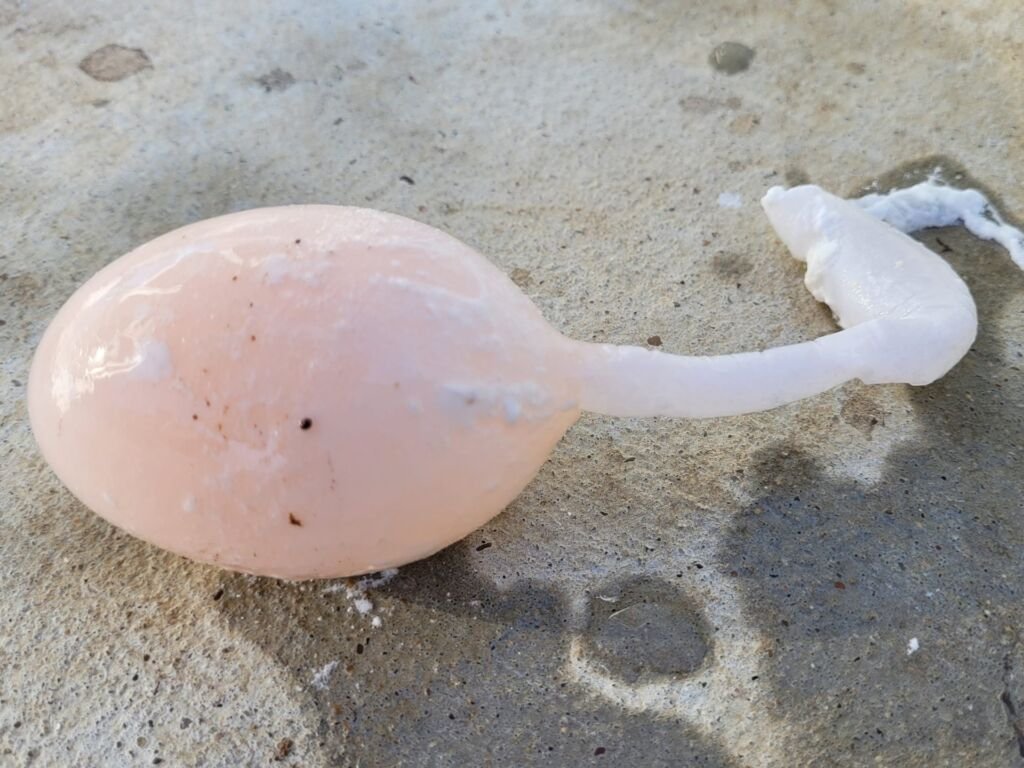Last updated on July 16th, 2024 at 06:13 pm
Welcome to the wonderful world of duck eggs! Whether you’re a seasoned duck keeper or just starting your journey, duck eggs offer a delightful and nutritious alternative to chicken eggs. They come with unique characteristics and quirks that can make them both intriguing and, at times, a little mysterious. From their rich flavor and impressive nutritional profile to the nuances of their care and storage, there’s so much to learn and love about these eggs.
In this article, we’re cracking open the answers to some of the most frequently asked questions about duck eggs. We’ll explore everything from their nutritional benefits and culinary uses to why your ducks might not be laying and how to hatch your ducklings. So, grab a cup of coffee, get comfy, and dive into the egg-citing facts about duck eggs!
- At what age do ducks start laying eggs?
- How often do ducks lay eggs?
- At what age do ducks stop laying eggs?
- Why are my ducks not laying eggs?
- Do I need to wash duck eggs?
- How do you store duck eggs?
- How long do duck eggs stay fresh?
- Tips for duck egg storage
- Do female ducks lay eggs without a male?
- How can you tell if duck eggs are fertile?
- How long do duck eggs take to hatch?
- Can you hatch duck eggs at home?
- Can you eat duck eggs?
- What do duck eggs taste like?
- How long do you cook duck eggs?
- Duck egg nutrition
- Are duck eggs more nutritious than chicken eggs?
- Why do duck eggs have a different color?
- What’s the best way to cook duck eggs?
- Can people with chicken egg allergies eat duck eggs?
- Why are duck eggs not sold in stores?
- Why are duck eggs so expensive?
At what age do ducks start laying eggs?
Ducks typically start laying eggs when they are about 5 to 7 months old. The exact age can vary depending on the breed, individual health, and environmental factors. Some breeds may start laying a bit earlier or later within this range. Ensuring they have proper nutrition, a comfortable living environment, and good overall health will help them reach their laying age more predictably.
How often do ducks lay eggs?
Ducks typically lay one egg per day, but this can vary based on the breed, age, and health of the duck and the time of year. For example, breeds like Khaki Campbells and Indian Runners are known for their prolific laying, often producing around 300 eggs per year! On the other hand, breeds like Muscovy ducks might lay closer to 100 eggs annually. Ducks generally lay more frequently in the spring and summer and may slow down or stop laying altogether during winter.
Read more about the frequency of duck eggs in the post How Often Do Ducks Lay Eggs? Breaking Down Duck Egg Production and More
At what age do ducks stop laying eggs?
Ducks generally lay eggs consistently for about 3 to 5 years, though this can vary depending on the breed, health, and living conditions. As they age, the frequency and quantity of egg production gradually decline. Some ducks may continue to lay a few eggs sporadically after this period, but their productivity will be significantly reduced compared to their peak laying years.
Why are my ducks not laying eggs?
There could be several reasons why your ducks aren’t laying eggs. Common factors include:
- Age: Young ducks may not start laying until they are about six months old, while older ducks may lay less frequently.
- Season: Ducks often lay fewer eggs in the winter due to shorter daylight hours.
- Diet: Ensure your ducks are getting a balanced diet rich in protein and calcium.
- Health: Check for signs of illness or stress, which can affect egg production.
- Environment: Ducks need a safe, comfortable space to lay eggs. Stressful environments can lead to reduced laying.
Read more about this topic in our post: No Eggs from Your Ducks? Discover 7 Reasons Why
Do I need to wash duck eggs?
Yes, you can wash duck eggs if they are dirty, but it’s generally recommended that you avoid washing them unless absolutely necessary. Duck eggs have a natural protective coating called the bloom or cuticle, which helps seal the pores in the eggshell and prevents bacteria from entering the egg. Washing the eggs can remove this protective coating, making them more susceptible to contamination.
If you need to clean duck eggs, it’s best to use warm water slightly warmer than the egg’s temperature. Gently wipe off any dirt or debris with a soft cloth or brush, being careful not to scrub too hard and avoid using soap or detergent. After cleaning, allow the eggs to air dry thoroughly before storing them in the refrigerator.
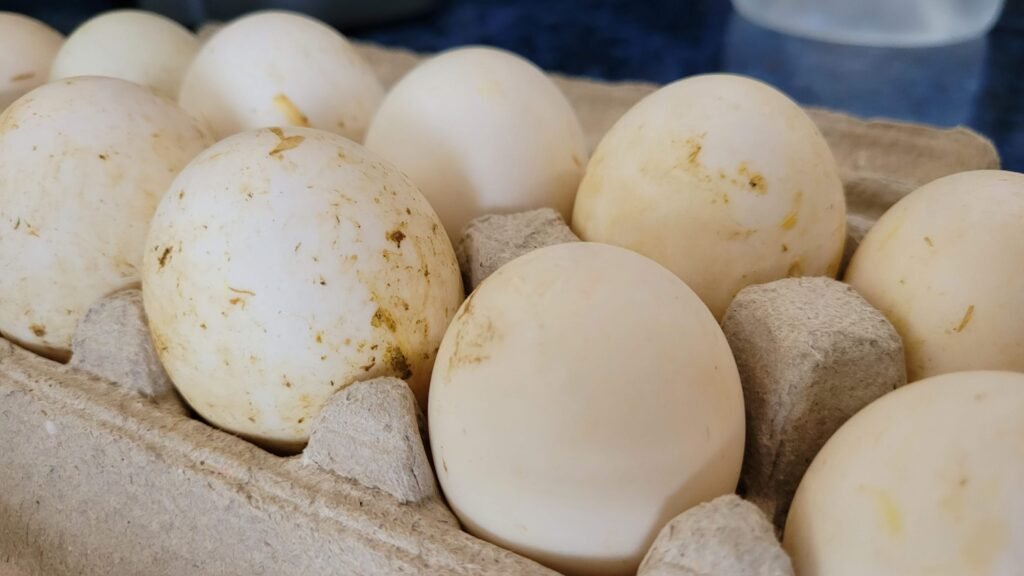
However, suppose the eggs are heavily soiled or have come into contact with substances that may harbor harmful bacteria, such as feces or other animal waste. In that case, washing them to ensure food safety is important. In such cases, wash the eggs with warm water and mild soap, rinse them thoroughly, and dry them completely before refrigerating.
Remember always to use clean hands and utensils when handling eggs to minimize the risk of contamination. Additionally, storing eggs properly in the refrigerator can help maintain their freshness and reduce the need for washing.
How do you store duck eggs?
To keep duck eggs fresh, store them in the refrigerator. They can last up to six weeks when properly refrigerated. If you prefer to keep them at room temperature, ensure they are in a cool, dry place, and use them within a week. For longer storage, you can freeze duck eggs by cracking them into a container and lightly beating the yolks and whites together before freezing.
Here’s how you can store duck eggs effectively:
- Refrigeration: Duck eggs should be stored in the refrigerator at temperatures between 33°F and 40°F (0.5°C to 4°C). Place the eggs in the main body of the refrigerator rather than the door, where temperatures can fluctuate more.
- Storage Position: Store duck eggs with the pointed end facing downwards. This helps keep the air cell at the larger end intact and centered, which can prolong shelf life.
- Egg Cartons: Place duck eggs in clean and dry egg cartons or containers to protect them from breakage and minimize exposure to odors and flavors from other foods in the refrigerator.
- Avoid Washing: Only wash duck eggs if absolutely necessary, as washing can remove the natural protective coating (bloom) on the eggshell and increase the risk of contamination. If washing is necessary, use warm water and mild soap, then rinse and dry the eggs thoroughly before refrigerating.
- Use within a Reasonable Timeframe: Duck eggs can typically be stored in the refrigerator for up to 3 to 4 weeks. However, for optimal freshness and quality, it’s best to use them within 1 to 2 weeks of laying.
- Check for Freshness: Before using duck eggs, perform a visual and smell check to ensure they are still fresh. Discard any eggs with cracked shells, unusual odors, or signs of spoilage.
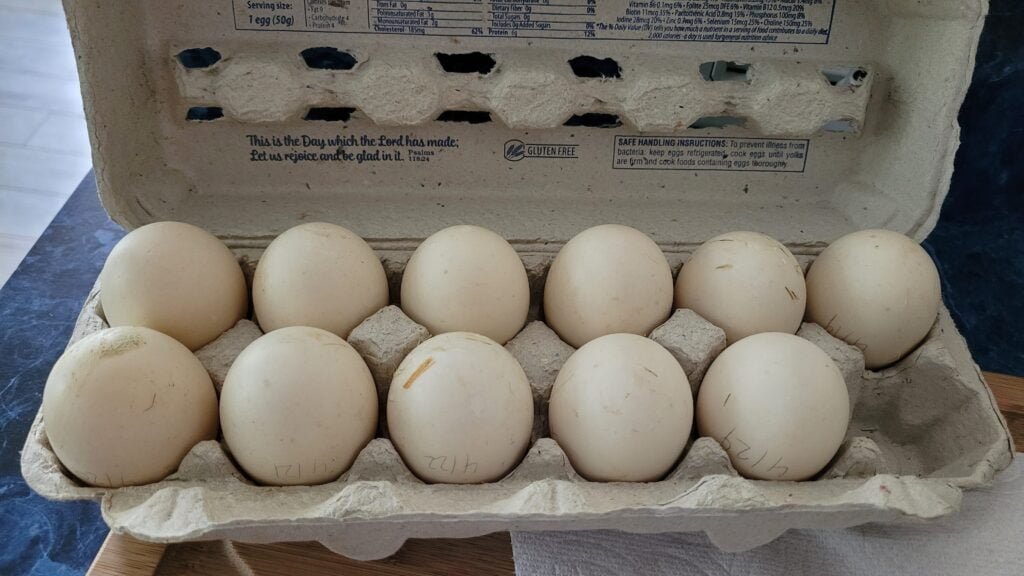
By following these storage guidelines, you can prolong the shelf life of duck eggs and ensure that they remain fresh and safe for consumption.
How long do duck eggs stay fresh?
Duck eggs, with their thicker shells, indeed have a longer shelf life compared to chicken eggs. When stored properly, fresh duck eggs can maintain their quality for an extended period. Here’s a breakdown of their shelf life under different storage conditions:
- Room Temperature: Fresh duck eggs can last for about 2 weeks at room temperature if stored in a cool, dry place away from direct sunlight and heat sources.
- Refrigeration: When stored in the refrigerator at temperatures between 33°F and 40°F (0.5°C to 4°C), duck eggs can stay fresh for up to 6 weeks. Refrigeration helps slow down bacterial growth and preserves the quality of the eggs.
- Freezing: Duck eggs can be frozen for long-term storage. When properly packaged in airtight containers or freezer bags, duck eggs can maintain their quality for up to 1 year in the freezer. Freezing helps extend the shelf life of eggs beyond what is achievable through refrigeration.
It’s important to note that proper storage practices, such as avoiding washing unless necessary, using clean containers, and maintaining consistent temperatures, play a crucial role in preserving the freshness and quality of duck eggs. Additionally, always perform a visual and smell check before using duck eggs to ensure they are still fresh and safe for consumption.
Tips for duck egg storage
Here are some tips for storing duck eggs to help maintain their freshness and quality:
- Refrigerate Promptly: Store duck eggs in the refrigerator as soon as possible after collecting them. Refrigeration helps slow down bacterial growth and preserves the freshness of the eggs.
- Store Pointed End Down: Place duck eggs in the refrigerator with the pointed end facing downwards. This helps keep the air cell at the larger end centered and intact, which can prolong shelf life.
- Use Clean Cartons or Containers: Store duck eggs in clean and dry egg cartons or containers to protect them from breakage and minimize exposure to odors and flavors from other foods in the refrigerator.
- Avoid Washing Unless Necessary: Only wash duck eggs if they are visibly dirty or soiled. Washing can remove the natural protective coating (bloom) on the eggshell, making the eggs more susceptible to contamination.
- Check for Freshness: Before using duck eggs, perform a visual and smell check to ensure they are still fresh. Discard any eggs with cracked shells, unusual odors, or signs of spoilage.
- Keep Consistent Temperature: Maintain a consistent temperature in the refrigerator, ideally between 33°F and 40°F (0.5°C to 4°C), to ensure optimal storage conditions for the eggs.
- Practice FIFO Rotation: To ensure you use eggs before they expire, practice first-in, first-out (FIFO) rotation by placing newer eggs at the back of the carton and using older eggs first.
- Avoid Extreme Temperatures: Avoid storing duck eggs near sources of heat or cold drafts in the refrigerator, as temperature fluctuations can affect egg quality.
By following these tips, you can maximize the shelf life of duck eggs and ensure they remain fresh and safe for consumption.
Do female ducks lay eggs without a male?
Yes, female ducks can lay eggs without the presence of a male. Just like chickens, female ducks have reproductive systems that allow them to produce eggs independently of mating with a male. However, the eggs produced by female ducks without mating will not be fertilized, meaning they will not develop into ducklings if incubated. Fertilization only occurs when a female duck mates with a male, and the eggs laid after mating have the potential to develop into ducklings if incubated under the appropriate conditions.
How can you tell if duck eggs are fertile?
You can determine if duck eggs are fertile by examining them closely. Here are some methods to check for fertility:
- Candling: Candling involves shining a bright light through the egg in a dark room to observe the contents. Fertile eggs will show signs of development, such as veins and a dark spot (the embryo) inside the egg. Non-fertile eggs will appear clear or with only a small air cell visible.
- Incubation: If you plan to incubate the eggs, you can place them in an incubator set to the appropriate temperature and humidity for duck eggs. After a few days of incubation, you can candle the eggs to check for signs of development, as mentioned above.
- Cracking Open: If you don’t mind sacrificing the egg, you can crack it open and examine the contents. Fertile eggs may have visible blood vessels or a partially formed embryo. Non-fertile eggs will typically have a uniform appearance without any signs of development.
These methods can help you determine the fertility of duck eggs, especially if you’re considering incubating them for hatching.
How long do duck eggs take to hatch?
Duck eggs typically take about 28 to 35 days to hatch, depending on the breed of duck. The exact incubation period can vary based on factors such as temperature, humidity, and the specific breed of duck. It’s essential to maintain consistent and appropriate conditions during the incubation process to ensure successful hatching. Some breeds may hatch closer to the shorter end of the range, while others may take longer. Regular monitoring and adjustment of the incubation environment can help optimize hatching success.
Can you hatch duck eggs at home?
Yes, you can hatch duck eggs at home using an incubator or by allowing a broody duck to sit on them. Incubation typically takes about 28 days for most duck breeds. If using an incubator, maintain a temperature of around 99.5°F (37.5°C) and keep the humidity level at 55-65%. Turn the eggs several times a day to ensure even development. If you have a broody duck, she will take care of turning and keeping the eggs warm.
Can you eat duck eggs?
Yes, duck eggs are absolutely edible and are enjoyed by many people around the world. They are commonly used in cooking and baking and can be prepared in various ways, just like chicken eggs. Duck eggs have a richer flavor and slightly different texture compared to chicken eggs, which some people find appealing.
Here are some common ways to enjoy duck eggs:
- Cooking: Duck eggs can be cooked in the same way as chicken eggs—boiled, scrambled, fried, poached, or made into omelets.
- Baking: Duck eggs are often used in baking recipes, where their higher fat and protein content can contribute to richer and moister baked goods, such as cakes, cookies, and bread.
- Preserving: Duck eggs can also be preserved by pickling or curing, adding unique flavors to dishes.
When consuming duck eggs, it’s essential to ensure they are fresh and properly handled and cooked to reduce the risk of foodborne illness. Additionally, individuals with egg allergies or sensitivities should exercise caution when trying duck eggs for the first time.
Overall, duck eggs are a delicious and nutritious alternative to chicken eggs and can be a delightful addition to your culinary repertoire.

What do duck eggs taste like?
Duck eggs have a richer, more robust flavor compared to chicken eggs. The yolks are larger and creamier, making them perfect for baking and cooking. They add a velvety texture to pastries and a delightful richness to savory dishes. If you love the taste of eggs, you’ll likely find duck eggs a delicious upgrade.
How long do you cook duck eggs?
The cooking time for duck eggs can vary depending on how you prefer them cooked and the specific recipe you’re following. Here are some general guidelines for cooking duck eggs:
- Soft-Boiled: For a soft-boiled duck egg with a runny yolk, cook it in simmering water for about 6 to 7 minutes.
- Hard-Boiled: To hard-boil a duck egg with a firm yolk, cook it in simmering water for about 9 to 10 minutes.
- Scrambled: Scrambled duck eggs can be cooked over medium heat in a skillet with a bit of butter or oil. Stir frequently and cook until the eggs are set but still moist, which typically takes about 3 to 5 minutes.
- Fried: Duck eggs can be fried sunny-side up or over easy in a skillet with a little butter or oil. Cook until the whites are set, and the yolks are cooked to your desired level of runniness, usually about 3 to 5 minutes.
- Poached: To poach a duck egg, bring a pot of water to a gentle simmer and add a splash of vinegar. Crack the egg into a small bowl, then gently slide it into the simmering water. Poach for 3 to 4 minutes until the whites are set, but the yolk is still runny.
These are just general guidelines, so adjust the cooking time based on your preferences and the specific characteristics of the duck eggs you’re using. Remember to handle and cook duck eggs safely to reduce the risk of foodborne illness.
Duck egg nutrition
Duck eggs offer a nutrient-rich alternative to chicken eggs, with several notable differences in their nutritional profile. Here’s an overview of the key nutrients found in duck eggs:
- Protein: Duck eggs contain slightly more protein than chicken eggs, making them a great option for those looking to boost their protein intake. Protein is essential for muscle growth, repair, and overall cellular function.
- Fat: Duck eggs typically have a higher fat content compared to chicken eggs. While this may contribute to their rich flavor and creamy texture, it’s important to consume fats in moderation as part of a balanced diet.
- Cholesterol: Duck eggs contain higher levels of cholesterol compared to chicken eggs. While dietary cholesterol has been a topic of debate, moderation is key, especially for individuals with specific health concerns like heart disease.
- Vitamins: Duck eggs are rich in vitamins, including vitamin A, vitamin B12, riboflavin (vitamin B2), and choline. These vitamins play crucial roles in various bodily functions, such as vision, energy metabolism, and brain health.
- Minerals: Duck eggs provide essential minerals like iron, phosphorus, selenium, and zinc. These minerals are vital for bone health, immune function, and energy production.
- Antioxidants: Duck eggs contain antioxidants like lutein and zeaxanthin, which are beneficial for eye health and may help protect against age-related macular degeneration.
It’s important to note that while duck eggs offer numerous nutritional benefits, individual dietary needs and preferences vary. Some people may prefer the taste and texture of duck eggs, while others may opt for chicken eggs or other alternatives. Incorporating a variety of foods into your diet is key to obtaining a broad spectrum of nutrients and promoting overall health and well-being.
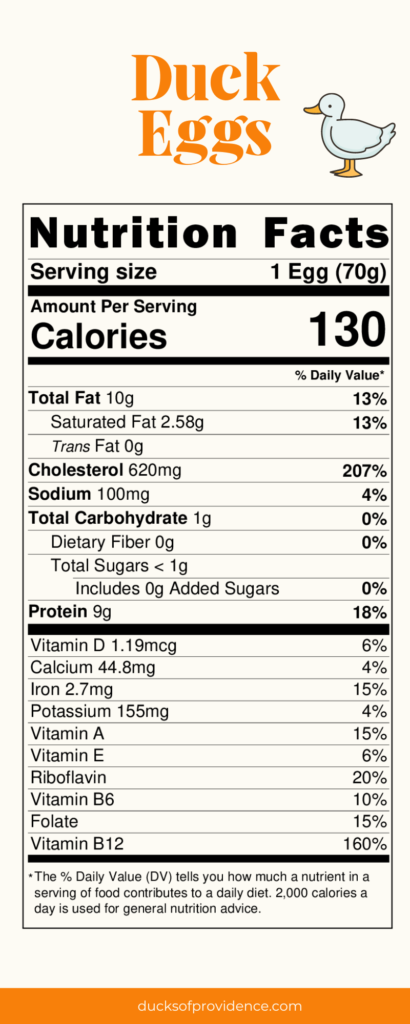
Are duck eggs more nutritious than chicken eggs?
Yes, duck eggs are generally more nutritious. They contain more protein, iron, and vitamins like B12, A, and D. They also have higher levels of omega-3 fatty acids, which are great for brain health. However, they are also higher in cholesterol and fat, so it’s something to keep in mind if you’re monitoring your intake.
The choice between duck and chicken eggs depends on your preferences and needs, as each type has its unique advantages:
| Aspect | Duck Eggs | Chicken Eggs |
|---|---|---|
| Size | Larger | Smaller |
| Flavor | Richer, creamier | Lighter |
| Nutrient Content | Higher protein, vitamins, minerals | Slightly lower in protein, vitamins, minerals |
| Shelf Life | Longer due to thicker shells | Shorter |
| Availability | Less common in regular grocery stores | Widely available |
| Allergies | Some who are allergic to chicken eggs can eat duck eggs, but not always vice versa | More common allergies, but less likely to cause allergic reactions compared to duck eggs |
| Cost | Typically more expensive | Generally cheaper |
| Versatility | Suitable for baking due to higher fat content | Versatile and widely used in various dishes |
Ultimately, the better choice depends on your dietary needs, taste preferences, and how you plan to use the eggs. Trying both and seeing which you prefer can be a good way to decide! Dive deeper into this topic with our post Duck Eggs vs Chicken Eggs: A Comparative Analysis.
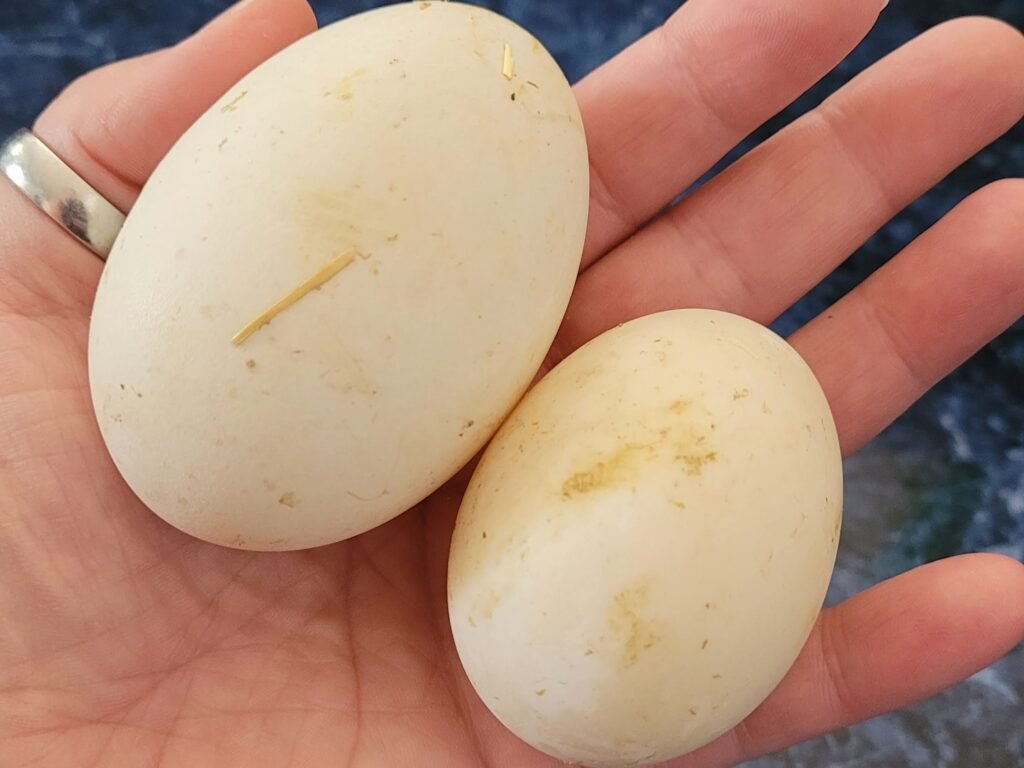
Why do duck eggs have a different color?
Duck eggs come in various colors, including white, blue, green, and even black. The color of the eggshell is determined by the breed of the duck and does not affect the taste or nutritional value of the egg. For example, Khaki Campbells typically lay white eggs, while Indian Runners can lay blue or green eggs.
What’s the best way to cook duck eggs?
Duck eggs can be used in any recipe that calls for chicken eggs. They are especially prized in baking due to their richer yolks, which add moisture and a delightful texture to cakes, cookies, and pastries. For savory dishes, try them scrambled, fried, or boiled. Remember that duck eggs have a thicker shell and membrane, so they might take longer to cook.Duck egg allergies
Duck egg allergies are relatively uncommon but can occur in individuals who are allergic to chicken eggs or other poultry products. Allergic reactions to duck eggs are typically caused by proteins found in the egg whites or yolks, similar to chicken eggs. Symptoms of a duck egg allergy may include:
- Skin Reactions: Itching, hives, eczema, or swelling of the skin.
- Respiratory Symptoms: Sneezing, runny nose, nasal congestion, coughing, wheezing, or difficulty breathing.
- Gastrointestinal Issues: Nausea, vomiting, diarrhea, abdominal pain, or cramping.
- Anaphylaxis: In severe cases, a duck egg allergy can lead to anaphylaxis, a life-threatening allergic reaction characterized by difficulty breathing, a drop in blood pressure, rapid pulse, loss of consciousness, or shock.
If you suspect you or someone else has a duck egg allergy, it’s essential to seek medical advice for proper diagnosis and management. Allergy testing, such as skin prick tests or blood tests, can help confirm a duck egg allergy. If diagnosed with a duck egg allergy, it’s important to avoid consuming duck eggs and any products containing duck egg ingredients to prevent allergic reactions.
If you suspect you have a duck egg allergy or experience symptoms after consuming duck eggs, consult with a healthcare professional for proper evaluation and guidance.
Can people with chicken egg allergies eat duck eggs?
Some people who are allergic to chicken eggs can tolerate duck eggs, but this isn’t always the case. Duck eggs have different proteins that might not trigger the same allergic reactions. However, if you or someone you know has an egg allergy, it’s crucial to consult with a healthcare provider before trying duck eggs.
Why are duck eggs not sold in stores?
Duck eggs are less commonly sold in stores compared to chicken eggs for several reasons:
- Demand: Chicken eggs are much more popular and widely consumed than duck eggs in many parts of the world. As a result, consumers generally have less demand for duck eggs, which may limit their availability in stores.
- Production: Duck egg production tends to be smaller and more localized compared to chicken egg production. Duck farming is less common, and the number of ducks kept for egg production is typically lower than that of chickens. This limited production may contribute to the scarcity of duck eggs in stores.
- Regulations: Some regions have regulations and restrictions regarding the sale of duck eggs, which can vary depending on local agricultural laws and food safety standards. Compliance with these regulations may pose challenges for commercial duck egg producers.
- Shelf Life: Duck eggs have a thicker shell than chicken eggs, making them more durable and longer-lasting. However, this also means they may have a longer shelf life than chicken eggs, making them less suitable for commercial distribution in stores where frequent inventory turnover is preferred.
- Perception: Cultural preferences and perceptions associated with duck eggs may also influence their marketability. Some consumers may be unfamiliar with duck eggs or perceive them as less desirable than chicken eggs, impacting their demand and availability in stores.
Overall, while duck eggs may be less commonly found in stores than chicken eggs, they are still widely enjoyed by many people and can often be found at local farms, specialty markets, or through direct-to-consumer channels.
Why are duck eggs so expensive?
Duck eggs are often more expensive than chicken eggs for several reasons:
- Limited Production: Duck egg production is typically smaller in scale compared to chicken egg production. Duck farming requires specific housing and environmental conditions, and raising ducks for egg production may require more resources and labor-intensive care compared to chickens. This limited production can contribute to higher costs associated with producing duck eggs.
- Lower Demand: Chicken eggs are much more commonly consumed and widely available compared to duck eggs. The lower demand for duck eggs means that producers may not benefit from the economies of scale enjoyed by large-scale chicken egg operations, which can lead to higher production costs per egg.
- Feed Costs: Ducks generally require a different diet compared to chickens, which can include specialized feeds tailored to their nutritional needs. The higher cost of feed for ducks, along with other inputs such as housing and veterinary care, can contribute to the overall expense of producing duck eggs.
- Handling and Packaging: Duck eggs often have thicker shells compared to chicken eggs, which can make them more challenging to handle and package. This can increase labor costs associated with sorting, cleaning, and packaging duck eggs for sale, contributing to their higher price.
- Perceived Value: Some consumers perceive duck eggs as a specialty or gourmet product due to their richer flavor and larger size compared to chicken eggs. This perceived value may justify a higher price point for duck eggs in the marketplace.
Overall, a combination of factors such as limited production, lower demand, higher production costs, and perceived value contributes to the higher price of duck eggs compared to chicken eggs. However, despite their higher cost, many people enjoy the unique flavor and nutritional benefits that duck eggs offer.
Related posts about duck eggs:
- No Eggs from Your Ducks? Discover 7 Reasons Why
- How Often Do Ducks Lay Eggs? Breaking Down Duck Egg Production and More
- Soft-Shelled Eggs in Ducks – Everything You Need to Know
- Breaking Down Egg Binding in Ducks: What Every Duck Keeper Should Know
- Duck Eggs vs Chicken Eggs: A Comparative Analysis
- The Ultimate FAQ: How Long Do Hard-Boiled Duck Eggs Last & More!


